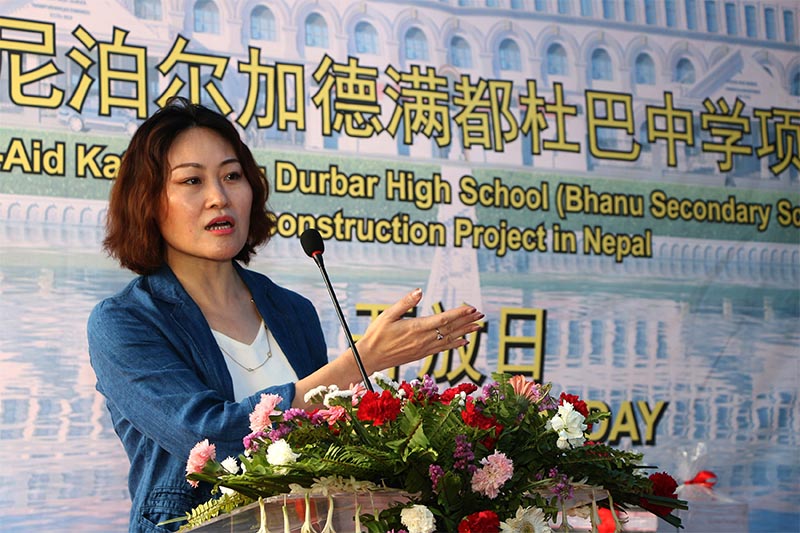Envoy Hou terms China-India Plus trilateral cooperation
Kathmandu, January 3
Chinese Ambassador to Nepal Hou Yanqi today said the China-India Plus (or ‘Two plus one’) concept of cooperation mooted by Beijing essentially meant trilateral cooperation.
Speaking at a press briefing this morning, Hou said the concept did not deem Nepal as a very small country but China and India would play leading roles.
“Actually that implies trilateral cooperation. The trilateral cooperation will be a win-win cooperation,” she said, adding such cooperation with Nepal would move ahead as per the demand and proposal of the Nepali side.
“There will be trilateral cooperation among the countries.”
The ambassador added that such kind of trilateral cooperation could be forged in the areas of infrastructure, telecommunications and training courses, among others.
The leaders of ruling Nepal Communist Party (NCP), including Prime Minister KP Sharma Oli, are against the China-India Plus concept reportedly agreed by Chinese President Xi Jinping and Indian PM Narendra Modi during Wuhan Summit on April 27-28, 2018. It was reported China was interested in further enhancing India-China Plus concept to develop a common strategy for Afghanistan, Nepal, Bhutan and Africa.
The concept also featured in the talks when Chinese President Xi visited Nepal in October last year.
The Nepali leaders are of the view that such concept suggests that China and India will have bigger roles and Nepal will have little role under ‘Two plus one’ cooperation model. In this backdrop, Hou said China had already built partnership with India and the US in relation to Afghanistan. “That is very simple, not very complicated one,” she said.
As far as the ongoing debate on the Millennium Challenge Corporation Compact Programme is concerned, Hou said Nepal as a least-developed country needed international support and assistance, not only from China, but also from other countries.“We welcome any kind of assistance to Nepal if it is in the area of economic cooperation,” she said, adding, Nepal could decide on its own without any external intervention.
“Economic cooperation should be forged equally and should benefit the Nepali people and promote Nepal’s national interests. We believe the Nepali government can take a positive decision as per the interest of Nepal.”
On recent arrests of more than 120 Chinese nationals in Nepal, the ambassador said the Chinese authorities had communicated with their Nepali counterparts after they found the individuals’ involvement in cyber crime. Stating that the arrestees were still in custody of Nepal Police, Hou said the Chinese government would protect legal rights of its citizens abroad, but not of those involved in illegal activities.
When asked whether China had any security concerns in Nepal, the ambassador said such concerns were the matters of common interests. Stating that the Nepal-China border has remained peaceful for long, she said some western countries did not like to see a stable and secure China, and good Nepal-China relations.
“I think this is a matter of concern for both the countries,” she said, adding, “Since Nepal and China are trusted neighbours, no outside force can intervene in the close relations between the two countries. “So the common concern is to make ourselves very stable, defend our sovereignty and territory, and safeguard international justice and law and order.”






